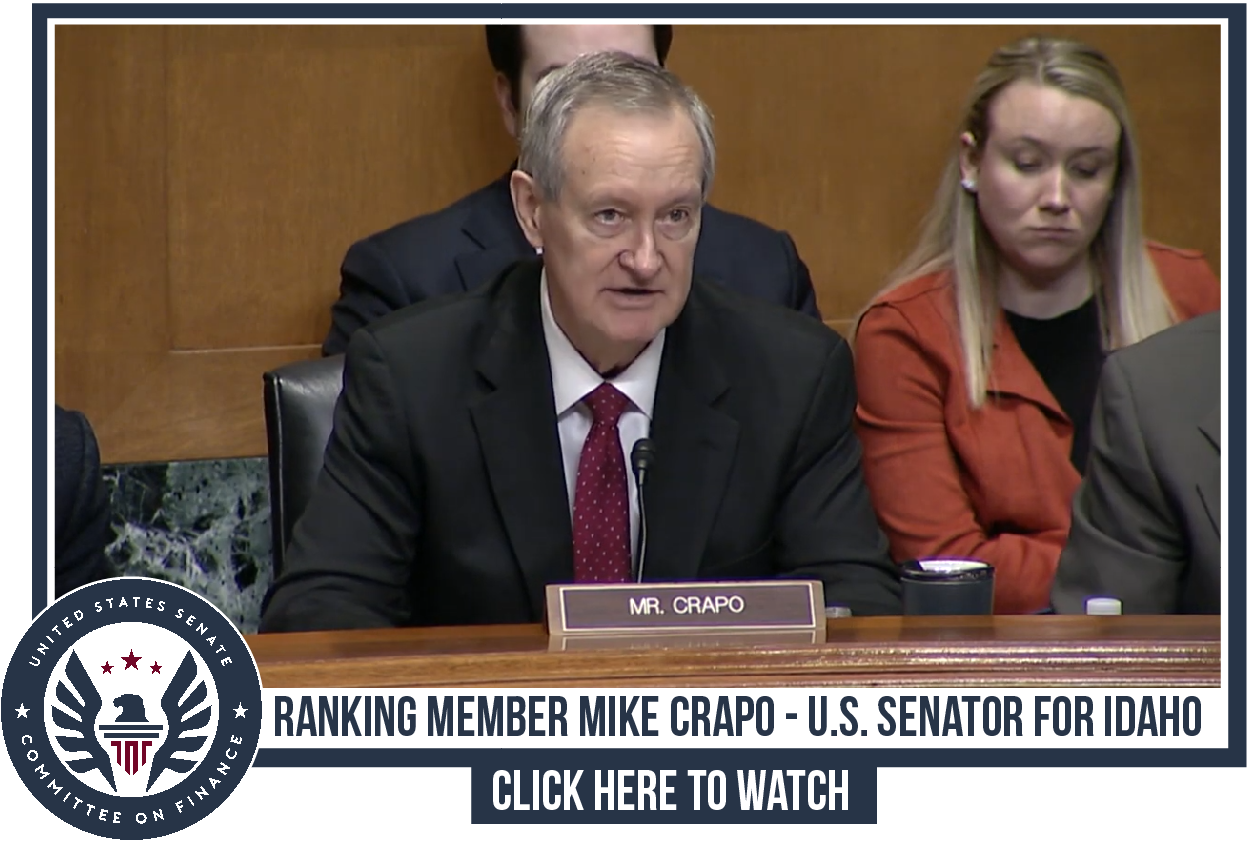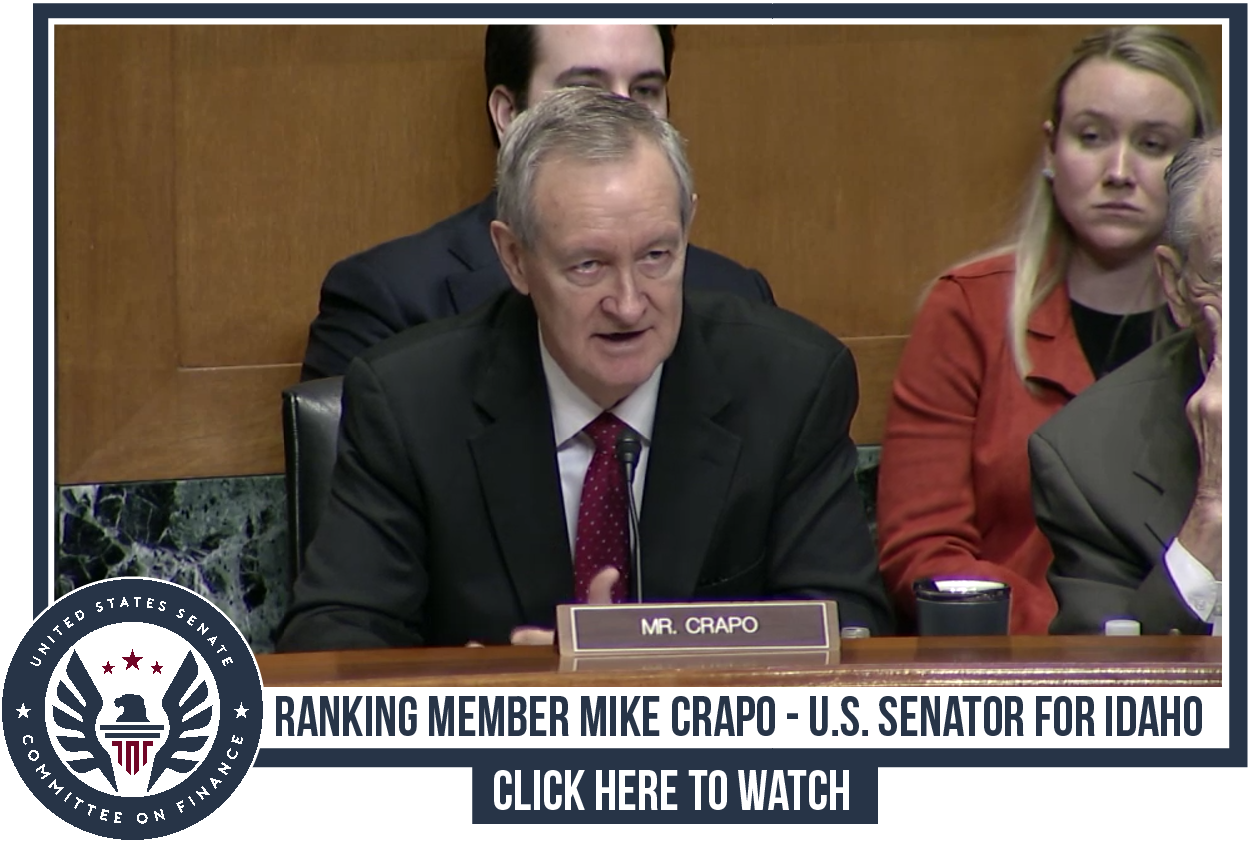Crapo at Hearing on President’s Budget: The Spending Binge Must Stop
Urges Administration to engage in bipartisan negotiations over debt ceiling
Washington, D.C.--At a U.S. Senate Finance Committee hearing on President Biden’s FY2024 budget, Ranking Member Mike Crapo (R-Idaho) said that after two years of economic mismanagement that contributed to record-high inflation and excessive deficit spending, the Biden Administration is doubling down with more of the same in its budget. Noting that Americans want Congress to exercise fiscal restraint, Crapo urged Treasury Secretary Janet Yellen to engage in bipartisan discussions regarding the debt ceiling.

Click here to watch.
On debt ceiling negotiations:
We are in agreement that we need to protect the full faith and credit of the United States. Frankly, the problem that we see, on the Republican side, is that it’s all tax and all spending increases in terms of the Administration’s approach to this. And while you and the Chairman just discussed a number of concerns you have with Republican ideas with regard to how to deal with this, the bottom line is we must stop trying to solve this problem with massive new spending and massive new taxes.
At this point, the President has refused to negotiate with Republicans on fiscal restraint policies that they believe need to be put into place with a new extension of the debt ceiling. We must engage in negotiations to get over some of these disagreements and this new debt ceiling resolution must include fiscal restraint. We have got to get some kind of attention to this. I think the American public is crying out for Congress to pay attention to this issue and put fiscal restraint in place. Can you commit, at least, to negotiate with Republicans as we try to work forward on some aspects of fiscal restraint to put into the debt ceiling discussion?
I interpret your answer to be that you are very willing to discuss the President’s budget tax increases and increased spending--but with regard to the debt ceiling discussion, you’re not willing to discuss any actual fiscal restraint in terms of spending control in the United States. If I interpreted that wrong, I’m sorry, but we have got to get negotiating on more than just whether the President’s budget is the right approach; there are other ideas and we engaged in that. I just hope you will take that message back to the President.

Click here to watch.
In his opening remarks, Crapo compared the economic mismanagement of the last two years against the strong economy that existed under Republican leadership. He also highlighted the $43.2 billion funding request for the Internal Revenue Service (IRS) in the President’s budget, which is in addition to the already-approved $80 billion awarded the agency in the partisan Inflation Reduction Act.
On the President’s failed economic policies:
The President’s budget demonstrates the Administration has not learned from its mistakes. After two years of policies that contributed to record-high inflation and excessive deficit spending, this Administration is doubling down with more of the same. The spending binge must stop. We must address our growing deficits in order to put the United States’ finances on a sustainable path, and pro-growth tax policy should be part of the solution.
The Tax Cuts & Jobs Act led to one of the strongest economies in generations. TCJA introduced competitive tax rates while broadening the base, including by enacting the first global minimum tax of its kind, and putting an end to corporate inversions. It also contributed to record-high corporate tax receipts, both nominally and as a share of gross domestic product. But instead of considering bipartisan, pro-growth policies, the President’s budget includes a whopping $4.7 trillion of new and increased taxes on American job creators, which ultimately means fewer jobs and lower wages.
On the $43.2 billion funding request for the IRS:
The Administration continues to hide its true intentions for transforming the IRS. The budget doubles-down on the $80 billion already given to the IRS, including two additional years of plus-up funding totaling $29.1 billion solely for “enforcement and compliance initiatives,” in addition to $14.1 billion more of yearly funding. That’s another $43 billion!
Secretary Yellen, I agree with you that having a funding plan for an agency budget that dwarves many others is “critical.” In the meantime, the IRS has embarked on a “spend first, plan later” approach that is not transparent or responsible, and is a surefire recipe for error, waste and mismanagement.
While we may not have all the details, we do know that only six percent of the existing plus-up funding is for modernization, while over 62 percent is solely for hiring--more than 93 percent of which is enforcement hiring. These new funds are not going to replace retiring IRS agents, as annual appropriations already provide that funding, and the Administration has not requested any reductions in IRS annual funding to account for replacing retirees with plus-up funding.
Next Article Previous Article
